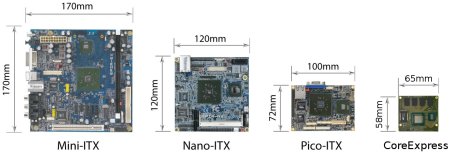Smallest x86 board ever?
Sep 3, 2008 — by LinuxDevices Staff — from the LinuxDevices Archive — 182 views Lippert has upped the maximum amount of RAM available soldered onto its CoreExpress-ECO computer-on-module (COM). Now available with 2GB of RAM, and targeting mobile embedded PC applications, the 28-gram, Intel Atom-based board uses Lippert's own 2.3 x 2.6 inch (58 x 65mm) “CoreExpress” COM format.
Lippert has upped the maximum amount of RAM available soldered onto its CoreExpress-ECO computer-on-module (COM). Now available with 2GB of RAM, and targeting mobile embedded PC applications, the 28-gram, Intel Atom-based board uses Lippert's own 2.3 x 2.6 inch (58 x 65mm) “CoreExpress” COM format.
(Click for larger view of Lippert's CoreExpress-ECO)
digg this story |
Lippert was the first board vendor we are aware of to announce a Menlow-based board, offering a glimpse of the CoreExpress-ECO — then known as the CoreExpress-Menlow — back in February. The board officially launched in April, touted as the first available Menlow-based board.
Today, Lippert claims the CoreExpress-ECO is “still the smallest advanced Computer-On-Module.” While no definition of “advanced” is offered, there is no argument that the board is quite small, indeed, compared to, say, an Atom-based PicoITX board, such as Axiomtek's PICO820. How much smaller?
At 3,770 square millimeters, the CoreExpress module covers roughly half the 7,200 square millimeter footprint of a PicoITX board (see illustration below).

CoreExpress is roughly half the size of PicoITX
(Source: Via, with enhancements. Click to enlarge)
Of course, PicoITX boards typically come with real-world I/O and lots of pin headers, whereas the CoreExpress-ECO is a “COM” (computer-on-module) intended to attach to a custom I/O board via its 220-pin surface-mount connector. So, the comparison is not all that fair. Stacking a custom baseboard would significantly increase the thickness and/or the overall dimensions of the package.
So, how does the CoreExpress-ECO compare in size to other available COMs? Glad you asked. Other contenders we've seen in the “tiniest Atom board” category include:
- Congatec Conga-CA, which uses the popular COM Express form factor measuring 3.75 x 3.75 inches (95 x 95mm), or 9,025 sq. mm.
- ADS Catalyst, which uses a proprietary form factor of 3.9 x 2.8 inches (99 x 71mm), or 7,030 sq. mm.
- Radisys Procelerant Z500, which measures 3.4 x 2.75 (86 x 70mm), or 6,020 sq. mm.
- Kontron nanoETXexpress-SP, which uses the terribly named nanoETXexpress form factor, 3.3 x 2.2 inches (55 x 84mm), or 4,620 sq. mm.
So indeed, the CoreExpress-ECO appears to be about 25 percent smaller than its closest competitor that we've seen so far. And, it comes in about 50 sq. mm. smaller than Via's own Mobile-ITX form factor, which appears to still be at the “prototype” stage more than a year after first being demonstrated.
More about the board
The CoreExpress-ECO is available with Intel's Z530 (1.6GHz) or Z510 (1.1GHz) (“Menlow”) chips. With the faster processor option, and a full 2GB allotment of DDR2 RAM, the CoreExpress-ECO consumes “around five Watts,” Lippert boasts. The company reckons that such frugality qualifies the board for battery-powered applications, including wearable computers, mobile healthcare devices, and automotive equipment. POS (point-of-sales/service) gear has also been a stated target market in the past. And, for industrial applications, an extended temperature option stretches the operable range from -40 to 85 degrees C.
The CoreExpress-ECO's I/O includes two PCI Express-x1 lanes and eight USB 2.0 ports. Other interfaces include parallel ATA, SDIO/MMC, SMBus, GMBus/DDC (graphics and memory bus / display data channel), and LPC-Bus (low pin count bus). The all-digital device lacks analog signals like VGA or Ethernet, or any legacy I/O, such as PS2, speaker, and similar peripherals, says Lippert.
The CoreExpress-ECO ships with a “standard” BIOS resident in ROM. Additionally, the board comes with a “system management controller” (SMC), apparently similar to the microprocessors of the same name found in Intel-based Apple systems. The SMC provides “Lippert enhanced management technology” (LEMT) functions that facilitate system supervision and control, Lippert says, citing for example an operation hours counter, watchdog timers, protected user flash area, and a 128-bit security key.
Availability
The CoreExpress-ECO modules appear to be available now for “project” (volume) customers, with pricing available on request. An available “Starter Kit” for system integrators includes a case, carrier board, LCD panel, power supply, and documentation, and comes with three hours of free support. Additionally, Lippert is available to develop custom carrier boards for the module, it says.
For more information, see our earlier coverage, here. Or, visit Lippert's CoreExpress product page, which may be found here.
This article was originally published on LinuxDevices.com and has been donated to the open source community by QuinStreet Inc. Please visit LinuxToday.com for up-to-date news and articles about Linux and open source.